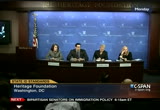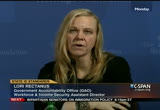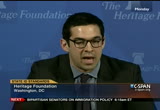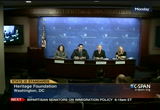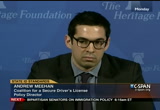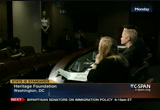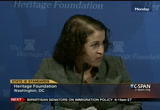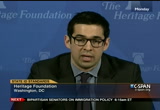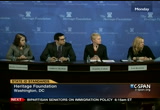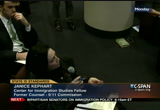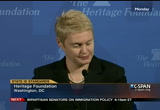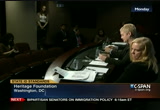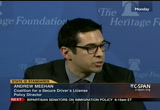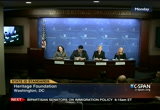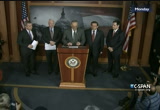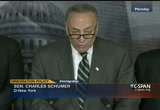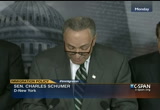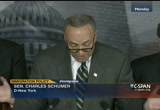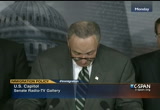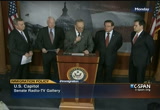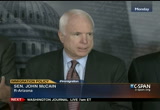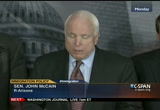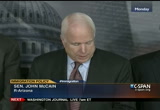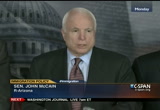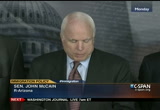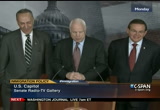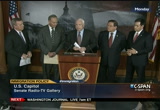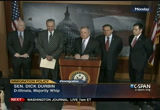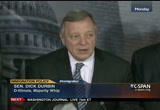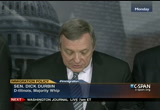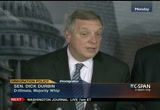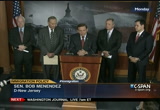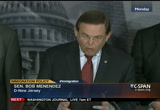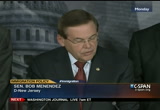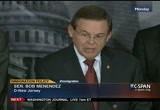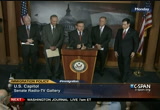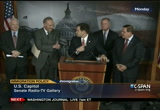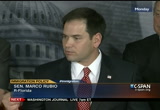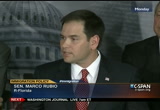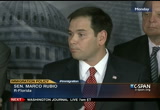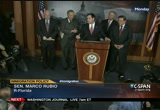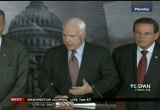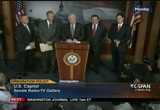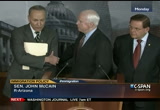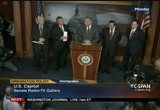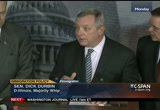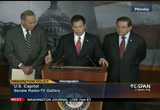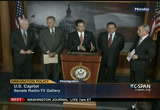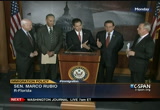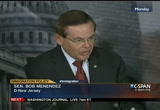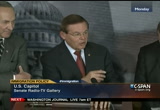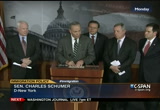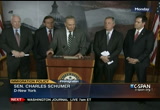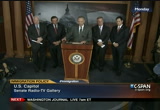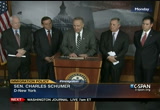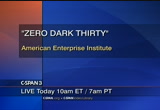tv Politics Public Policy Today CSPAN January 29, 2013 6:00am-7:00am EST
6:00 am
2010, there is a provision in there that calls for a national standard. that seems to me to be a good idea. do you think that is doable? it seems like a good idea. >> that calls for a national standard. makell say that we don't policy and i would not comment on that but i will say that it is the federal vs. state issue. there is money involved. it has to do with financial vitality of local vital statistics agencies. i think there are many, many political issues that need to be addressed. it all sounds really good on the face of it but when you think
6:01 am
of how that would be accomplished, i think there could be a lot of unanticipated consequences involved. >> there are thousands of entities issuing -- issuing thousands of documents. there are 6000 entities and 14,000 documents? >> yes. >> that is part of these decisions in addition to state'' rights. >> this is not a new idea, either. the prevention act of 2004 included a provision requiring hhs to set standards for birth certificates which goes more to the core of the 9/11 commission. an announcement was made in omb that they would be issuing the proposed regulation in september. i think there were a little optimistic in that the election was right around the corner but
6:02 am
they have since made another announcement that a proposed reg come out in march but i would not hold your breath. >> let's jump back to the funding issue. one of the best sources of information is some of the reports done by janice here. that really looks at the funding issue more than anyone else i have seen so that is a great source. janice gephardt who is joining us today. >> i am from the state university of buffalo. what is the difference between an enhanced drivers license and one that is fully compliant. new york state is not fully compliant. >> it varies from state to state. delaware is not an enhanced a driver's license state but we are compliant with the real id
6:03 am
act. it is just a different format and some of the features are the same. most of the verifications' are the same. >> the intelligence reform and terrorism prevention act of 2004 required a that edp verify citizenship of everyone exiting and entering the border. this is a problem for folks in new york state are any border states may not have access to a passport. it could have taken new six- eight months and there were huge delays of the passport office. in an effort to kind of meet that problem, the state department with customs and border protection worked with several states like washington state, michigan, vt., and york to produce an enhanced drivers license.
6:04 am
it is centrally issued an only issued to u.s. citizens and it is a document that is certified through various federal notices that demonstrates the holders citizenship. if you can imagine, you are living in buffalo, n.y., and you are crossing the border all the time to conduct business and you have to wait six-eight months to get a passport from a federal mandate, this creates a lot of problems. the cdp flexible in into meant -- and implementing the requirements. they offered tear sheets at the border to let people know this was a requirement and estates became aggressive making sure the enhanced a driver's license was available. >> amongst the talk of
6:05 am
nationally standardized birth certificates, checking security records, interstate sharing of pictures for facial recognition, what is the argument that is not a national id. should we recognize it as such? >> real id is not a national i.d.? very simply, it is not. a national i.d. is something that would be issued by the federal government. a real idea or driver's licenses are issued by the state. that is a stark contrast. >> another component is that states are not required to meet this, these are voluntary standards. the ways that these standards are met will not necessarily be exact from state to stay.
6:06 am
>> absolutely, the federal id implemented minimal standards but they did not tell states how to meet those standards and we are doing some things that are not necessarily dictated in the real id act. a state verification system does not exist yet but we have several procedures in place to do the same thing but not in that format. many states are making progress and many of them are doing things in different ways whether it be using electronic verification systems, training of employees or a multitude of different things to meet the intent of the minimum standards. >> the nationalized birth certificate and facial recognition are not required by the federal id act. people get confused sometimes about what is in real id. it is only 40 pages.
6:07 am
it is pretty accessible. >> nothng? no comment? >> i have done a lot of work on this. i may former 9/11 commission counsel. a lot of material in the report comes from the work i did with my team. i have done two annual reports on federal idea that you are familiar with. there is a piece of the 2004 act that requires a birth certificate regulation and we recommended that. in the 9/11 commission report because we learned when we looked at the id's that the hijackers got, mostly all of them were legal but there were a
6:08 am
few fraudulent ones especially in virginia. they were legitimately issued virginia id's but they were fraudulently obtained. they have gone to counterfeiters and gotten does before they're able to get them. the birth certificate piece of that that fits in forensic lake, the birth certificate is one of the most vulnerable documents around. part of the 2004 act was a real id and the creation of real id suggestions, realizing the birth certificate piece of it. the birth certificate regulations were not written. they have been sitting there at hhs for years. i have met multiple times with the gentle man who helped to that regulation creation.
6:09 am
he met with all the states multiple times. it is sitting there politically in the bush administration and the obama administration for political reasons, they have not wanted to release that regulation. they want to digitize the private records and make them accessible to driver's license- issuing agencies in any other agency that needs it. it is the one piece of real idea that has not been done and the state's complaint is a cost issue and i would love to hear a mess cohen's response. for us on may 9/11 commission, checking accounts of that fraud of the birth certificate as one of the most vital things you can do. eve has done a tremendous job digitizing those records.
6:10 am
what exactly are the issues with of the states and with amba in terms of not implementing that piece of real idea? >> i will give you a delaware perspective. it is extremely complicated. we have any number of jurisdictions issuing driver's license and i.d. cards. there is so many levels of technology involved with the 14,000 different types of birth certificates. in delaware, we are now just getting moving on the delaware eve records. we have a population of 900,000 and it has been difficult. i don't necessarily think there's a problem, it is just not moving as fast. because we were not doing e- verification for delaware but we
6:11 am
are verifying the authenticity of the burst into the get documents electronically and fraudulent documentation. we have been very successful. eve needs to move quicker. we have a huge issue with the puerto rico and burst and it's not too long ago were their own government said -- with the puerto rico and birth certificates not too long ago were their own government said not to honor them. it is not moving as fast as we would like. >> can you wait for the microphone? >> one of the biggest issues that reaches the identity theft issue is this. for me, i worked in the senate and helped pass the law in 1998.
6:12 am
the identity of that side of this is just as important to me on the public safety side as any of the counter-terrorism issues. we do a lot when we prevent identity theft. everybody uses it if they want to do anything nefarious. that is what the issues i really emphasized that the last couple of years is getting the vital records checked. thank you. >> there is a new $2 million pilot that is being done with three states and it will be different from the first pilot they did. it will look of the vital records agencies, clean them up, and it will move into integrating through amba the eves process which was almost a non-starter a couple of years ago. additionally, there is an issue with confirming out of state birth certificates because,
6:13 am
typically, what ends up happening is when you correlate other agencies, dmv may be hit with a $5 or $10 cost and when you talk about a credential that is issued at a cost of maybe $3.75, an additional 85 cents and another $5 double the costs. for agencies and the rockeries that are typically revenue sharing, this is almost a dead on arrival. >> thank you. yes? >> if you would give us a primer of the state level as to the usefulness of a non-compliant ids. 40% is pretty amazing between
6:14 am
political and law enforcement and other reasons. could you go over why continue to issue non-compliant ids? >> that is a good question. there is not that much difference between non-compliant and compliant in delaware. those are for people who don't need anything for federal purposes or who already have a passport are in the process of getting a compliant id. 6% of people have what they need and we are only three years in so that number continues to go up. on the flip side, we have unintended consequences for people having that. the drivers' license has become qualified-identification in this country and people were being turned away from their financial institutions because of the kemper identity at a federal level, -- because they can't prove their identity at a
6:15 am
federal level, it creates problems. >> it is difficult without specific problems from dhs as to what our citizens can expect. >> and the last comments from the panel? last questions? thank you all for joining us and join me in giving a round of applause to our panelists. [applause] [captioning performed by national captioning institute] [captions copyright national cable satellite corp. 2013] >> a bipartisan group of senators is proposing changes to emigration reforms. they spoke with reporters for about 45 minutes. >> we want to thank everybody for joining us. and we're here to announce today that the five of us here today and eight of us in total, including senators mccain, rubio and bennett have come together on bipartisan principles for immigration reform legislation that we hope
6:16 am
can pass the snot -- the senate in overwhelming fashion. we still have a long way to go. but this bipartisan -- sorry, we still have a long way to go but this bipartisan blueprint is a major break through. it's our hope these principles can be turned into legislation by march and have a mark up by the committee with a goal of passage out of the senate by late spring or summer. senator durbin and i spoke to the president yesterday to update him on the group's progress. and he couldn't be more pleased. he strongly support this is effort. the key to our compromise so to recognize that americans overwhelmingly oppose illegal immigration and support legal immigration. to this end our framework contains four basic pillars. first, we create a tough but
6:17 am
fair path to citizenship for illegal immigrants currently living in the united states that is contingent upon securing our borders. second, we reform our legal immigration that will build the american economy and strengthen american families. third, we create an effective employment verification system that will present identity theft and tend hiring of future unauthorized workers and lastly, we establish an improved process for e admitting future workers to serve our work force needs while protecting all workers. other bipartisan senators have stood in the same spot before trumpeting similar proposals. but we believe this will be the year congress finally gets it done. the politics on this issue have
6:18 am
been turned upside down. for the first time ever, there is more political risk in opposing immigration reform than in supporting it. opportunity to act. but we will only succeed if the effort is bipartisan. by their presence today, my republican colleagues are making a significant statement about the need to fix our broken immigration system. we democrats are equally serious. we do not want immigration as a wedge issue. much rather we want a bipartisan bill that solves the problem and becomes law. we recognize that in order to pass bipartisan legislation none of us can get everything we want. that's why our framework says we can address the status of people living here illegally while securing our borders and creating an immigration enforcement system that ensures we will not again confront
6:19 am
another 11 million people coming here illegally. on day one of our bill, the people here without status who are not criminals or security risks will be able to live and work here legally. that will make it easier for them to learn english without fear of deportation. but to prove to the american people that we are serious about permanently ending illegal immigration to the u.s., we say we will never put these individuals on a path to citizenship until we have secured our borders and combated the people overstaying their legal viz sass. -- legal immigration visas. we are asking our colleagues in the house and senate to join us in this difficult work ft it's time to work together to pass legislation that improves our security, grows our economy and ensures that we will continue to be a nation that lives up to the values of our founders. i'm going to turn it over to senator mccain in a minute.
6:20 am
i want to say he has been the grew in our group. -- the glue in our group. his wisdom and strength and courage, his steadfastness and many other adjectives that i'll us. want me to go on? [laughter] and i want to say that every member of your group, including senator gram who couldn't be here, senator mccain has a statement from him, have really been terrific in terms of understanding that we have to meet in the middle. that the mission of getting a bill done to strengthen america is more important than any of us clinging to a specific belief. and so i'm optimistic. thanruly optimistic, more i was when we had our first meeting in december that we can get this done. and i want to thank every one of the members here.
6:21 am
it's been so far -- we're only a part of the way done but it's been a great experience so far and one that gives all six of us a great deal of optimism. senator mccain. >> i'd like to thank you the senator for his leadership. i'd like to thank the democratic leader. dick durbinthere has not been anyone in america who has fought harder for the so-called dreamers than dick durbin has and he will continue to have the gratitude of many americans. my friend senator rubio who is a new important voice in this immigration reform. senator menendez and senator gram who is uncharacteristically absent from this gathering. as the senator mentioned it has a first step in what will be
6:22 am
continue to be difficult but achievable. i don't have to remind anyone the last major attempt was six years ago. we will again attempt to get the resources to secure the border, streamline our immigration system and create a tough but fair path to citizenship for those here illegally. and i would like to testify again t security situation along the southwest border is not perfect. there remains several areas, particularly in arizona where people's homes are being invade and drug smug letters are crossing every night and they deserve the same level of security all of us have. there is no question, there has been a significant reduction in illegal crossings over the past five years. apprehension by the border control have dropped 70% from 2005 to 2012.
6:23 am
but their work is not yet complete. greater focus need to be paid to drug traffickers and criminals that cross the border. arizona continues to be a major smuggling corridor and hub for drug trafficking organizations. to combat this, we need to invest in high-technology, proven surveillance systems that will give the border patrol ability to detect and apprehend illegal entries into the united states. it's achievable and can be completed within the next few years if we commit to it. the next important step is to ensure we don't repeat the mistakes of 1986 where we gave amnesty to 3 million people, promised the border would be secure and we're dealing with 11 million people here illegally. so that has to have increase in fines on employers that
6:24 am
knowingly hire illegal workers. we have to have employment verification system that will end the hiring of future unauthorized immigrants. we need to shut off the magnet that attracts illegal workers. we will put in place a legal worker program to provide a humane and effective system that allows immigrant workers to enter the country without seeking the aid of human traffickers or drug cartels. any legislation that pass congress must establish legal channels for workers to enter the united states whether they are high skill, low skill or agriculture workers so we can free up officials to focus on those individuals intending to do our nation harm through drug smuggling, people trafficking and possibly terrorism. providing citizenship for dreamers, developing a
6:25 am
measurement to determine when the board certificate truly secure. -- when the border is truly secure,reforming our future immigration system to better meet the needs of our employers ensuring an exit system to combat visa overstays and creating a program that makes certain u.s. agriculture has the necessary workers to maintain america's food supply are some of the issues we've committed to addressing and solving in a bipartisan manner. and finally, we come to the most controversial piece of immigration reform and that's how to deal with the approximately 11 million people living in the united states outside of legal status. what is going on now is unacceptable. in reality what has been created is a de facto amnesty. we have been too content for too long to allow individuals to mow our lawn, serve our food and even watch our children while not affording them any of the benefits that make our
6:26 am
country so great. i think everyone agrees that it is not beneficial for our country to have these people here hidden in the shad dose. -- hidden in the shadows. let's create a system to bring them forward. allow them to settle their debt to society and fulfill the in necessary requirements to become law abiding citizens of this country. this is consistent with our country's tradition of being a nation of laws and a nation of immigrants. i'd like to read senator gram's brief statement. he says i hope the third time is a charm. i've enjoyed working with my colleagues in drafting these principles and believe we are off to a good start. the bipartisan principles represent a break through on instance and i hope they will be seen as a break through in forming a coalition to solve our immigration problems. the coalition must also include the president and the house of representatives.
6:27 am
my hope is this bill will start in the senate and receive an overwhelming bipartisan vote. we are a long way from having legislative language but i believe 2013 represents us the best chance to pass immigration reform in many years. with a reasonable amount of political give and take we will be successful. however, if we fail in our efforts to pass comprehensive immigration reform, i do believe it will be many years before anyone is willing to try and solve this problem. we should have full understanding of how difficult it is. in the last couple of days we have been able to invent a nuclear option in the senate. a lot of people don't appreciate how important it was for us to get that done. we were involved in a bipartisan efforts to pass that.
6:28 am
thanks for the cooperation of our two leaders we were able to do that. there is a desire for bipartisan ship here in this body. i think we can show the country and the world that we are capable of tackling this issue, a looming and terrible issue that has to be resolved in a bipartisan basis. and i believe the majority of the american people support such an effort and i want to thank my colleagues again and the ever congenial senator. >> now senator durbin. >> i want to thank my colleagues, john mccain, thanks. we've been down this road before but i feel good about our chances this time. chuck thank you for your leadership on this and bob and lindsay and i understand that you've been the force blind this.
6:29 am
-- the force behind this. he's the glue, you're the force and it's worked. we've come to this moment. and here we are facing the issue of immigration. nothing new in america. this inflammation has been -- this nation has been debating the issue of immigration since the first group got off the boot and wanted to know why the second boat was coming. but it is critical to remember that those immigrants whose d.n.a. we carry had something special in their make up to get up and move to come to this nation for a great opportunity they couldn't find in another place. that's part of what we are today. and secondly it says something about our nation about how many people want to come here in this opportunity for an expanding economy. they want to be here in america. the third point is important, our immigration system is broken and has been broken for a long time. 16 years ago when i was elected to the senate, one of the first phone calls i received from ted kennedy.
6:30 am
he said i want to let you know i'm chairman of the subcommittee. i need you on . there we haven't looked at a serious immigration law for ten years, we're going to get it done. i signed up. but it didn't happen. and time passed, another 16 years and we still have a broken immigration system. with 11 million people living in limbo. well this statement of value that is we give you today is a good solid starting point to make certain we fix the system. it has the basics. basics we insist on. strengthen border security with the best technology using enforcement resources are for the most serious threats. second, require employers to verify that all their employees are legal and have a means of verification that is quick and accurate. third, illegal immigrants already in the united states
6:31 am
will be given their chance to earn their way to citizenship. it won't be easy. it will take them time and determination but if it weren't for that determination they wouldn't be here in the first place. among that a criminal background check. make certain they pay any fines we establish. pay their taxes which is a critical part of this whole comprehensive approach. give them a chance to earn their way into citizenship learning english and the basics about america's history. and making sure that the amount of illegal immigrants -- amount of legal immigration that is allowed in the united states is based on the state of our economy. we are going to enshrine in here the principle when it comes to job openings americans get the first grab at it and the first opportunity and that's the way it should be. we're going to make certain beyond that there are opportunities for others and there are a variety of different ways we approach it. let me close by addressing one
6:32 am
issue that is near and deer. it's been 12 years, 12 years since i introduced the dream act. i never gave up because when you meet these young people you can't give up. but there were some disappointing times and sad times. the last time around i met with these young people and i told them i'm never giving up on you, don't give up on us. that's what this is about. the dream act is going to be an integral part of comprehensive reform. that will give these people the chance they have been begging for. these young people have shown an extraordinary amount of courage. they have identified to the world who they are. theand when we met them and cae
6:33 am
to know who they were, this issue starting moving to a place where in the last presidential campaign both candidates were asked their position on the dream act. that says a lot about where this issue has brought us and i think it's been an integral part of bringing us to this moment in time. i look forward to happy news for these dreamers and so many families who are looking forward to a better day in america. >> thank you. let me join my colleagues in saying i appreciate the incredible spirit that has been displayed in these negotiations leading to these statements of principles and for what iand whe clearly sense after someone who has worked on this for years in the house when i was there and in the senate, i app am the most optimistic i have been in some time. i recognize there are difficult challenges ahead but i just get the sense of a spirit and a commitment that is far beyond what i've seen in some time. and the american people support this.
6:34 am
in poll after poll when you take the elements of our principles, they have said this is what we want to see in reform of our broken system. there is a reason for that. if i want to secure the nation, i cannot secure the nation unless i know who is here to pursue the dream versus who is here to do it harm. fy have people in the shad dose, i don't know what their ultimate purpose is here. so when we talk about the nation's security, reform is necessary for security as it is for our elements of principles to enhancing what we've done in further border security. when i talk about the nation's economy, reform is critical to the nation's economy. the reality is that even in a tight economy, there are all types of industries in our country which have used the work of immigrants every day to
6:35 am
achieve the economic goals of those industries. if you got up this morning and had fruits for breakfast, it was probably picked by an immigrant worker. if you had vegetables for or chicken for lunch, you probably had it plucked by the cut up hands of an immigrant worker. if you slept in a hotel of the nation, you probably had your room done by an immigrant worker. if you are looking at some of the cutting edge technologies in our country, you saw the ability of making america what it is by an immigrant worker. so in so many dimensions this is about the economy of our nation as well. and finally two elements of this that i think are important within the principles that i support is the fact we have seen in other countries in the world where there is no path way
6:36 am
to citizenship there is instability. fair path way. it will be one in which those who have come to this country to achieve the american dream will come forth, must register with the government or they will lose their opportunities. will have to go through a criminal background check, will have to pay any previous taxes they did not pay although many do pay through taxpayer i.d. numbers or a social security number. but they will have to pay anything they didn't pay before. they will have to for the first time in u.s. history learn english to be able to become a permanent resident. we require that for u.s. citizenship which we have never required that for a permanent resident. it is a higher standard. that is a real opportunity at the end of the day. and lastly, someone who is a big advocate of making sure our economy is strong as a result
6:37 am
of immigration reform but we preserve a core value of our society which is family reunification. and how do we do that in a way that is smart and promotes legal immigration versus what has families divide so long and how do they become reunified. i believe we can take care of those issues. finally let me say a word or two in spanish. \[speaking spanish] [speaking spanish] [speaking spanish]
6:39 am
6:40 am
terms of the senate, not in terms of my life. i have lived surrounded by immigrants, my neighbors are immigrants, i'm mara into a family of immigrants. i see the good of immigration every day, how important it is for our future. as most americans, i know how critical the immigration system has been for our heritage and our future. by the same token, i see the negative is that illegal immigration is causing our country. these are issues that the vast majority of americans agree with. they believe we do have a legal immigration system that works and they recognize that we have now is not the 21st century legal immigration system and that is why i am so pleased the first principle in this effort is one to modernize our immigration system so it reflects the reality and the needs of the 21st century. by the same token, we recognize the market has a right to reform immigration laws. that is why i am pleased to look at these out lines. this will insure that we are
6:41 am
never here again with a situation that we face today. none of this is possible if we did not address the real and yet there are 11 million human beings in this country today that are undocumented. that is not something that anyone is happy about, not something that anyone wanted to see happen, but that is what happened. we have the obligation and need to address the reality of the situation we face in a way that is fair to the people who are doing it the right way, in essence, the hundreds of thousands of people who come to our offices every year whose relatives are waiting in line to legally come here. we have to be fair to them. we also have to ensure we did not do anything to encourage people to come here illegally in the future. by the same token, we are dealing with 11 million human beings who are here undocumented, the majority of whom have come here in pursuit of what all of us would recognize as the american dream. that is what we endeavour to move forward here on. on both sides of this issue
6:42 am
there are legitimate points to be raised. there are people who are concerned about how much this will cost the american economy. we have to be frank about dealing with those issues. this country owes $16 trillion. by the same token, we need to be honest with ourselves with just how important immigration is to our economy. for those who are here and are making contributions towards our future -- today is an important step. the issue of immigration is not a simple one. but we have the opportunity to do it right. if we do, we will do a tremendous service to our country and our future. and briefly, in spanish. [speaking spanish] >> ok, we are ready for your questions.
6:43 am
6:44 am
>> okay, we are ready for your questions. >> there are some republicans in the house that have already pushed for opposition. are you willing to change anything you have proposed? >> of course we want to work in a bipartisan basis. we are encouraged speaker boehner has specifically stated that he believes what comprehensive immigration reform is an issue that should be taken up by the house of representatives and legislation passed by the president. we are standing ready. we have finished our work. we have made significant progress. while we're doing that, sitting down with our colleagues in the house, republicans and democrats, sitting down with the president of the united states, to expedite this entire process. there is opposition in the senate two comprehensive immigration reform. there is some competition in
6:45 am
the house. but i am confident the majority of both houses, led by the president of the united states, who made this a major campaign issue, that we will succeed. we are not going to get everybody on board. >> you mentioned the fact that you have been here before. since 2007, senator kennedy stood with you -- 2007 was the year that you must [inaudible] you have expressed optimism. our broken must fix system while optimism is high. why is it different? >> as i have stated before elections, the republican party is losing support of our hispanic citizens. we realize there are many issues where everything we are in agreement with our hispanic citizens, but this is a preeminent issue with those citizens.
6:46 am
also, over the years, republicans in particular, but also democrats, and all of our citizens, have realized the reality of what all my colleagues just stated. we cannot continue as a nation with the 11 million people residing in the shadows, and we have to address the issue, and it has to be done in a bipartisan fashion. and if we do succeed, and i think we will, it will be a testimonial to ted kennedy's effort years ago that laid the groundwork for this agreement. you will find this agreement has very little different from that of the legislation that was led by senator kennedy some years ago. >> one other thing, the public's attitude has changed. four years ago they said fix the border. now they much prefer a comprehensive solution, including a path to citizenship, as well as fixing the border and doing the things
6:47 am
we have talked about. what is interesting, when you look the polling data, it is democrats, independents, and republicans who agree with that, people in the north and east, south agree with that. the public is your new for real change now. -- the public is yearning for real change now. that will help as well, and of course, what senator mccain said. >> center, the president is set to speak tomorrow on this issue. why do this today, why one day early? >> we do not have much time and became to an agreement this -- and we came to an agreement this quickly. as i mentioned, senator durban and i spoke to the president. he was delighted that we came to an agreement. we will be working together to try to get something done. obviously, the senate has a chance to create a bipartisan coalition because we need both parties to succeed, and that gives us a unique opportunity.
6:48 am
we intend, as senator mccain said, the white house, senate, and the house to be working together on this. it seems to me at least that the senate is the most fortuitous place to move forward first. let me just add one thing. i was engaged in active negotiations on immigration. center barack obama was in the room. as a senator, he was committed to it, is still committed to it today. in fairness, president bush was outspoken for his attitude on immigration control. we have clear presidential support here. we have here, in our conversation with the president, he cheered us on. he said, let's do this, let's not let this fall behind. >> i want to echo this point. i was with the president with the hispanic congressional caucus friday night and he made it clear, a major priority for me, to move toward and time is
6:49 am
of the essence. >> what are the main differences between this plan and the one that you deduced on your own? -- and apply new introduced on your own? >> this is an outline of principles. the details will involve input from this group as well as all the members in the senate, and if it is to become law, the house. the principles, i think, are similar, if not the same. it is the reason i signed onto it. it says we have to modernize our legal immigration system, we have to have a real in force the mechanism, and we have to deal with people who are here now in a way that is responsible but humane. this allows people to make their status at this moment legal if they meet certain benchmarks. ultimately, to have access to the regular opportunities than anyone else would have to get a green card.
6:50 am
once you have that, you are three to five years away from becoming a citizen. not an easy process, but certainly a fair one, one that speaks to our legacy as a nation of laws, as well as the place of immigrants. >> [inaudible] in the principles, you talk about the path to legalization certify that the border is secure? does that move parallel? >> we clearly want to make sure that the enforcement mechanisms have been. one of the things we all here is, you are going to do the legalization part, but not the enforcement part. the best way to guarantee that people will feel comfortable with that is to put in the following. understand that the visa entry and exit system, which everyone recognizes need to be done, real progress in terms of improvement at the border, two critical things that people need
6:51 am
is to certify before we move to the final stage in the process. not the legalization stage, but the green card. if we're going to be realistic about that, we need to be meaningful. [speaking spanish] >> let me just say, this is important. {speaking spanish] [speaking spanish] >> let me just say this, this is important. we have to work with the governors and the organizations and citizens on the border
6:52 am
states that are of the major victims of the broken borders. we need to work with the department of homeland security, and we will, in order to assure the american people that never again will we face a problem with a large number of people in this country illegally. en espagnol, vamanos. [laughter] >> i think what we envision, of course, subject to are working out the legislation, when this becomes law, individuals who are undocumented in the country would come forward. they would register with the government and have a pending status. that is not permanent residency, they have to earn that over a long period of time. that pending status would allow us to go through their criminal background checks and allow them, at that period of time, to come forth out of the shadows and be able to get least be able to be here in a status
6:53 am
that will allow them to do certain things. after that, we are going to have to have security elements of the border. then we will have a process where we will have to wait at the end of the line, where people who are presently waiting under the existing system to get their status here in the united states, which is part of what we envision having to deal with, will then, after that -- if they have maintained good citizenship during that pending period of time -- will be able to move toward permanent residency. but at the beginning of the process, individuals would be able to come force. there would have to go to the government, go to the criminal background check, and assuming they pass that check, begin the process. [speaking spanish] [speaking spanish]
6:54 am
[speaking spanish] [speaking spanish] >> here is the important point which bob made. immediately, when the bill passes, people living here in the shadows would get a legal right to stay here and work. they would no longer be deported, provided they do not have a criminal record. harassed. they would be working. and then once the parameters that we still have not set up, but are in the bill about securing the border, then there
6:55 am
would be eligible for green cards. but the ability to stay here and work, stay in america and not be deported or harassed, comes virtually immediately. >> [inaudible] you don't have a lot of details on future follow. how are you going to deal with this? >> future flow has been one of the shoals upon which the good ship of immigration has floundered. we know that. we have had discussions with both labor, the afl-cio, seiu, business, other business groups, and while we have been negotiating these principles, they have been sitting down talking to one another. it would be best from all points of view this business and
6:56 am
labor could agree on a future flow proposal. obviously, we would have to agree with it, too. that would be helpful. according to both donahue and trumka, they are making a lot of progress, much more in 2009, and in 2007, when john and senator kennedy worked on it. >> [inaudible] we are worried about unemployment. we have declining wages and tens of millions of those skilled laborers. what would you say to working- class americans who worry that their wages and jobs will be lost -- >> it is in our principle that we will tie future float to employment.
6:57 am
-- future flow to employment. if there are jobs available floor -- four americans to take, that will be one of the major components of future flow. if there are jobs that there are not americans for, then, obviously, it will be much easier for people to come in. an example, farm work. americans, by and large, wherever it is, americans do not do the farm work. so we need workers like that. but we're all united in the view that immigration is good for america and good for employment and good for a growing economy. to have people who will pay taxes, who will contribute to the economic well-being is a very good thing, and we aim to get it done. >> there are thousands of
6:58 am
graduates with ph.d.'s, master's degrees in technology that we want, we want to remain and work in the united states of america. [captioning performed by national captioning institute] [captions copyright national cable satellite corp. 2013] >> several live events to tell you about today on our companion network, cspan 3. the american enterprise institute examines how the film," 0 dark 30," examines interrogation by the cia. that is at 10:00 a.m. eastern. at noon, you will see a cato institute panel on the libertarian state of the union
6:59 am
focusing on how libertarian ideas will affect public policy this year in congress and at the white house. >> in a few moments, today's deadline and your calls live on "washington journal." at 10:00 eastern, a senate subcommittee will hear from health care professionals about the primary doctor shortage and president obama will be in las vegas today to outline his proposed immigration policy changes just before 3:00 p.m. eastern. the american enterprise institutetwo new members of cone joining us this morning. in about 45 minutes, he will discuss the role but new members will play in determining the gop agenda. at 8:30 eastern, we will be joined by the democratic representative from maryland, a member of the financial-services committee. committee.
111 Views
IN COLLECTIONS
CSPAN Television Archive
Television Archive  Television Archive News Search Service
Television Archive News Search Service 
Uploaded by TV Archive on

 Live Music Archive
Live Music Archive Librivox Free Audio
Librivox Free Audio Metropolitan Museum
Metropolitan Museum Cleveland Museum of Art
Cleveland Museum of Art Internet Arcade
Internet Arcade Console Living Room
Console Living Room Books to Borrow
Books to Borrow Open Library
Open Library TV News
TV News Understanding 9/11
Understanding 9/11